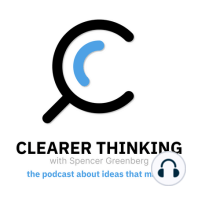52 min listen

How can we un-break politics? (with Magnus Vinding)
How can we un-break politics? (with Magnus Vinding)
ratings:
Length:
54 minutes
Released:
Dec 21, 2022
Format:
Podcast episode
Description
Read the full transcriptHow can we as individuals and as societies un-break politics? What is the two-step ideal of reasoned politics? How might this ideal apply to specific political issues, like free speech? Is it possible to reach agreement or even compromise on political issues that are rooted in intrinsic values? How can we reduce our own political biases? Are there some political issues which must always or by definition be zero-sum, or can all issues conceivably become positive-sum?Magnus Vinding is the author of Speciesism: Why It Is Wrong and the Implications of Rejecting It, Reflections on Intelligence, You Are Them, Suffering-Focused Ethics: Defense and Implications, and Reasoned Politics. He has a degree in mathematics from the University of Copenhagen, and in 2020, he co-founded the Center for Reducing Suffering, whose mission is to reduce severe suffering in a way that takes all sentient beings into account.Further reading:"Compassionate Free Speech" (2020), an essay by Magnus Vinding on free speech, compassion, and social mediaReasoned Politics (2022), a book by Magnus Vinding available for free downloadHate: Why We Should Resist It with Free Speech, Not Censorship, by Nadine Strossen"How a cultural revolt against "political correctness" helped launch Trump into the presidency", by Lucien Gideon Conway III"Understanding Libertarian Morality: The Psychological Dispositions of Self-Identified Libertarians", by Ravi Iyer, Spassena Koleva, Jesse Graham, Peter Ditto, and Jonathan HaidtReporters Without Borders indexA Twitter thread by Michael Petersen that presents some evidence suggesting that bans are counterproductive to fighting disinformation"The Automaticity of Affect for Political Leaders, Groups, and Issues: An Experimental Test of the Hot Cognition Hypothesis", by Milton Lodge and Charles S. Taber"Beyond Western, Educated, Industrial, Rich, and Democratic (WEIRD) Psychology: Measuring and Mapping Scales of Cultural and Psychological Distance", by Michael Muthukrishna, Adrian V. Bell, Joseph Henrich, Camerom M. Curtin, Alexander Gedranovich, Jason McInerney, and Brandon Thue"Disagreement or Badmouthing? The Role of Expressive Discourse in Politics", by Michael Hannon
Released:
Dec 21, 2022
Format:
Podcast episode
Titles in the series (100)
Education and Charity with Uri Bram by Clearer Thinking with Spencer Greenberg